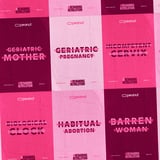
When I was pregnant with my second child, I remember sitting in my ob-gyn's office awaiting an ultrasound and peeping at my medical chart on the table next to me. Among the scribbles were the words "approaching GP." Turns out, GP meant geriatric pregnancy, a medical term for any pregnant person 35 years or older. I wasn't even technically at that stage, and there it was, labeling me as someone who was approaching someone who waited too long to have children.
Women are inundated with phrases that demean their bodies - like "inhospitable womb," "lazy ovary," and "incompetent cervix" - and place blame squarely on their shoulders.
What's worse, that label isn't nearly the most offensive and wholly unnecessary medical term used to describe any aspect of pregnancy, birth, or motherhood. Women are inundated with phrases that demean their bodies - like "inhospitable womb," "lazy ovary," and "incompetent cervix" - and place blame squarely on their shoulders. Imagine going through hours of strenuous labor and overhearing a doctor comment on your "poor maternal effort" or your "failure to progress."
Even outdated and underused terms - like "spontaneous abortion" or "habitual abortion," both of which refer to types of miscarriage - are still the current official medical terminology on the books.
Considering how common postpartum depression is, and that one in nine new mothers have some form of it, it seems an easy place to effect change would be in destigmatizing and modernizing the words associated with fertility, pregnancy loss, birth, and motherhood.
Prompted by a gut-wrenching video post in which a woman recounted her experience with how a doctor's description of her medical standing left her "feeling shitty," Peanut - the first social network to connect women throughout all stages of motherhood - has decided to do something about it.
As part of a "Renaming Revolution," the company released a glossary of 63 phrases due for an update, along with their suggested revisions. The glossary was created with expert panelists ranging from linguists and family therapists to ob-gyns, and according to one of its contributors, Dr. Somi Javaid, it includes "terms that serve the same purpose while empowering women rather than shaming them."
In addition to medical terms, the list also includes progressive takes on often-disparaging labels surrounding birth plans, breastfeeding, and childcare status, like "stay-at-home mom."
Along with the digital release of the glossary, Peanut plans to circulate printed copies to clinics and physicians, but mostly hopes that, in the hands of women, once emotionally wrought conversations can be reshaped from the ground up. Because most doctors are willing to use language that women prefer used in one-on-one discussions about their health, those pursuing pregnancy or planning to give birth can now be armed with a vocabulary that serves them.
"This glossary is the first step in transforming some of the negatively-charged terms that are too often used during the most sensitive and vulnerable times in women's lives," Peanut founder and CEO Michelle Kennedy said in a statement to POPSUGAR. "Our hope is . . . to create even more safe spaces for women to connect using language that reflects their experiences without dehumanizing them."
Read on for a sample of what is included in the comprehensive Peanut glossary.
Fertility
Hostile uterus
Uterine lining implantation struggles (ULIS)
When cervical mucus makes the movement of sperm challenging.
Infertile
Reproducive struggles
Struggles to conceive after 12 months of unprotected intercourse.
Inhospitable womb
Uterine lining challenges
When uterine conditions make it difficult to become or stay pregnant.
Lazy ovary / premature ovarian failure
Early ovarian decrease
When ovaries stop functioning sooner than expected.
Viability scan
Pregnancy scan at 6-10 weeks
Determines if embryos are present and if the pregnancy is progressing.
Loss
Evacuation of retained products of conception
Compassionate removal
Removal of the pregnancy tissue from the womb.
Failed pregnancy
Pregnancy that will not carry to term
A pregnancy that will not carry through to term.
Habitual abortion
Recurrent miscarriage
Three or more consecutive pregnancy losses before 20 weeks gestation.
Medical termination
Compassionate induction
Ending the pregnancy by taking medicine.
Missed miscarriage / silent miscarriage
Miscarriage without symptoms
When the embryo has died but hasn't been released yet.
Spontaneous abortion
Pregnancy loss
Loss of pregnancy naturally before 20 weeks.
Pregnancy
Geriatric pregnancy
35+ pregnancy
Pregnancy at the age of 35 years or older.
Incompatible with life
Life-limiting diagnosis
When an unborn child is diagnosed with life-limiting conditions.
Incompetent cervix
Early cervical dilation
When the cervix shortens and opens early without any other symptoms of labor.
Lazy uterus
Uterine atony challenges
When the uterus does not contract back on its own after pregnancy.
Uneventful pregnancy
Smooth pregnancy
When the second-half of pregnancy is without medical complications or challenges.
Birth
Birth defect
Birth difference
A physical or biochemical difference present at birth.
Failure to progress
Slowed labor
When labor slows and delays delivery of the baby.
Natural birth
Vaginal or surgical birth
When a baby is born vaginally or via a cesarean birth.
Poor maternal effort
Pushing challenges
When maternal exhaustion or labor fatigue interferes with fetal descent.
Unfavorable cervix
Non-dilated cervix
A cervix that is not prepared for vaginal delivery.
Motherhood
Birth mother
Birther
Person who carried the child but is not their mother figure.
Birth defect
Birth difference
A physical or biochemical difference present at birth.
Failure to thrive
Slow to grow
When baby is under a certain growth percentile.
Insufficient milk supply
Low-milk supply
Lower milk production when breastfeeding.
Stay-at-home mom
Full-time childcarer
A mother who cares for their children full-time.


0 Commentaires